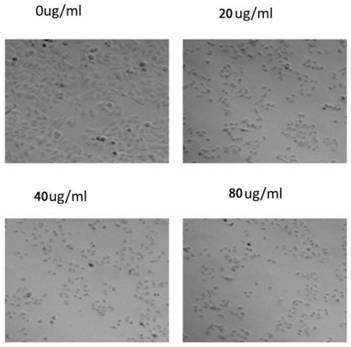A kind of recombinant bee venom polypeptide and its application
一种蜂毒、序列的技术,应用在应用、重组DNA技术、肽等方向,能够解决易降解、蜂毒肽性质不稳定、限制蜂毒肽等问题
- Summary
- Abstract
- Description
- Claims
- Application Information
AI Technical Summary
Problems solved by technology
Method used
Image
Examples
Embodiment 1
[0028] Embodiment 1: A specific preparation method of recombinant bee venom polypeptide comprises the following steps:
[0029] 1. Synthesize the nucleotide sequence encoded by the recombinant bee venom polypeptide gene: react the nucleotide with the protected active group connected to the solid phase carrier CPG in advance with trichloroacetic acid to remove its 5'-hydroxyl protective group DMT , obtain free 5'-hydroxyl, synthesize DNA raw material phosphoramidite to protect nucleic acid monomer, mix with activator tetrazolium to obtain nucleoside phosphorous acid activated intermediate, activate its 3' end, and 5'-hydroxyl is still DMT protection, condensation reaction with free 5'-hydroxyl in the solution, followed by capping reaction, there may be very few 5'-hydroxyl groups in the condensation reaction that did not participate in the reaction, and subsequent reactions were terminated with acetic anhydride and 1-methylimidazole , and finally under the action of the oxidan...
Embodiment 2
[0033] Example 2: Effects of Recombinant Bee Venom Polypeptides on the Expression of Cervical Cancer Cell Lines and HPV16 / 18 E6 and E7
[0034] (1) Growth inhibition test of recombinant bee venom polypeptide cervical cancer cell line
[0035] a. Select Hela (HPV18 positive) and Caski (HPV16 positive) cells in the logarithmic growth phase and digest them with trypsin to make a cell suspension, count on a cell counting plate, and dilute the cells to a density of 4*104 / ml. After fully mixing the diluted cells, inoculate them in a well plate, and add 100ul to each well (add along the side wall, do not shake).
[0036] b. Four concentration gradient groups of 0ug / ml, 20ug / ml, 40ug / ml, and 80ug / ml, with 3 replicate wells for each concentration. After the cells adhered to the wall for 12 hours, different concentrations of drugs were added to act for 24 hours and 48 hours. Discard the medium containing the drug, and add a new medium containing 10% CCK-8 solution.
[0037] c. After ...
Embodiment 3
[0055] Example 3: Recombinant bee venom polypeptide inhibits cervical cancer and HPV16 / 18 E6, E7 expression in vivo test on tumor-bearing nude mice
[0056] (1) Establishment and grouping of tumor-bearing nude mouse models
[0057] a. Balb / c-nu nude mice, female, age 6-8 weeks, body weight 18-22g, raised in SPF environment, 60 in total. HeLa and Caski cells in the logarithmic growth phase were digested with 0.25% trypsin, centrifuged and washed twice with serum-free medium, and the cell concentration was adjusted to 10^7 cells / ml with serum-free medium. Under aseptic conditions, 0.2 ml of cell suspension was extracted with a syringe with a No. 6 needle and inoculated subcutaneously in the right axilla of nude mice sterilized with 75% alcohol.
[0058] b. About 4 days after the inoculation, nodules appeared under the skin of nude mice or until the tumor tissue grew to about 150mm 3 , perform random grouping. Volume V=long diameter*short diameter*longitudinal diameter
[005...
PUM
 Login to View More
Login to View More Abstract
Description
Claims
Application Information
 Login to View More
Login to View More - R&D
- Intellectual Property
- Life Sciences
- Materials
- Tech Scout
- Unparalleled Data Quality
- Higher Quality Content
- 60% Fewer Hallucinations
Browse by: Latest US Patents, China's latest patents, Technical Efficacy Thesaurus, Application Domain, Technology Topic, Popular Technical Reports.
© 2025 PatSnap. All rights reserved.Legal|Privacy policy|Modern Slavery Act Transparency Statement|Sitemap|About US| Contact US: help@patsnap.com



